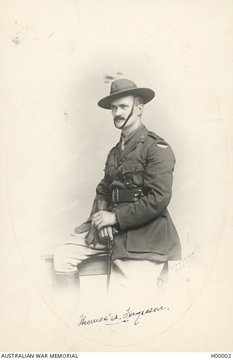FERGUSON, Thomas Alexander
| Service Numbers: | Not yet discovered |
|---|---|
| Enlisted: | Not yet discovered |
| Last Rank: | Captain |
| Last Unit: | 41st Infantry Battalion |
| Born: | Concord West, New South Wales, Australia, 8 May 1877 |
| Home Town: | Not yet discovered |
| Schooling: | Not yet discovered |
| Occupation: | Insurance Inspector |
| Died: | War Service related , 13 November 1921, aged 44 years, place of death not yet discovered |
| Cemetery: |
Grafton Cemetery, NSW |
| Memorials: |
World War 1 Service
| 18 May 1916: | Involvement Captain, 41st Infantry Battalion, --- :embarkation_roll: roll_number: '18' embarkation_place: Sydney embarkation_ship: HMAT Demosthenes embarkation_ship_number: A64 public_note: '' | |
|---|---|---|
| 18 May 1916: | Embarked Captain, 41st Infantry Battalion, HMAT Demosthenes, Sydney |
Newspaper Report - Death of Major Ferguson
EX-SOLDIER'S DEATH.
LATE MAJOR T. A. FERGUSON
COLLAPSE AT HIS HOME
Death on service was sudden enough, truly; but the circumstances were peculiar to the stirring days of war. For a man to survive the ordeal, however, to come back strenuously to resume the bracing conflict of civil life, and then to die almost without warning, is infinitely tragic. Thus died Major Ferguson, at the age of 42, at his home in McHugh Street, Grafton yesterday morning. For some days before his death, Major Ferguson had complained of a cold and a spasmodic pain in the back of his head, but he carried on his work in the usual way. Even yesterday morning he did some jobs at home, and, while Mrs. Ferguson was applying some hot foments, her husband collapsed suddenly and passed into a state of convulsion, from which he never recovered. The cause of death is supposed to have been due to a cerebral tumour. The deceased gentleman was not feeling well on Armistice Day, but he found energy enough to attend the soldiers' function at the Rowing Club at night, where he presided over the gathering, and, incidentally made a most eloquent appeal on behalf of the men who had risked the great adventure. He was an active man, a strong disciplinarian. — both with himself and others — and his young sons have before them an exemplary type of manhood.
HIS CAREER:
The late Major Ferguson ("Fergy," as he was known to many) was formerly an auctioneer in Casino. He was an insurance agent in Byron Bay when he enlisted, and was also Area Officer in that district, and had charge of the Light Horse. He married Miss Geraldine Riley, of Green Ridge, Casino, and leaves four sons — Jack (13), Harry (11), Alan (9), and Gerald (7). Since his return from the war in 1919, he has been engaged in conjunction with Mr. Fred Doberer, of Grafton, in the business of auctioneering, acting as outside agent. He was also secretary of the Pastures Protection Board. He acted as president of the Grafton branch of the Returned Soldiers and Sailors' League. During his four years' service abroad, the late Major Ferguson was mentioned in despatches. He went away as captain with the 41st Battalion of the 11th Brigade, in the 3rd Division, and went through the hard training on Salisbury Plain before that division was ultimately at the close of 1916, released for action in France. Having taken part in many engagements, he was promoted to the rank of major, and while second-in-command of the 41st, in 1917, crossed to England to attend the Senior Officers' course at Aldershot. It was about that time that Major A. R. Heron, D.S.O. (late of the 42nd), assumed command of the 41st Battalion. When, in August, 1918, Lieut.-Colonel Heron went on leave, Major E. J. Dibden temporarily took over the command of the 41st, while Major Ferguson received the honor of an appointment as temporary C.O. of the 43rd. Battalion, with the brevet rank of Lieut.-Colonel.
The deceased officer's boys were always alert to listen to one of their father's war yarns, and his story of the cat that used to run along the top of the trenches when "Parapet Joe" (German machine-gun was raking the sector, is fixed in their memory. Some stirring yarns were told at the gathering in Grafton on Armistice night, when Major Ferguson invited those present to relate their "windiest” experiences on the other side. The same night, rather curiously, a suggestion by one of the trustees of a fund amounting to about £200, which was part of the Australia Day Fund, and had been specially allocated for relief for distressed soldiers and their dependents, that this sum be handed over to the Soldiers' Memorial Fund was fervently opposed by the deceased officer. Major- Ferguson said that as far as he was concerned, he would contest with his last breath any idea of transferring that money to the memorial fund. For years to come, he contended, the occasion would arise when soldiers or soldiers' dependents would need assistance, and he thought it fitting that this fund should be kept — and added to — wholly for that purpose. He was supported in this, by ex-Lieutenant Barnes M.C.
For two years the late Major Ferguson has lived in McHugh Street, adjoining the residence of Mr. D. J. Lobban and the latter expresses his admiration for a man who unassumingly played his part in the great war and was always ready since his return to defend the cause of the Digger.
THE FUNERAL:
All ex-A.I.F. men of Grafton and surrounding districts are asked to meet at the deceased officer's residence in McHugh Street at 10.30 a.m. to-day to attend the funeral. – The Daily Examiner, Grafton, issue dated Monday November 14, 1921.
Submitted 27 November 2016 by John Johnston












